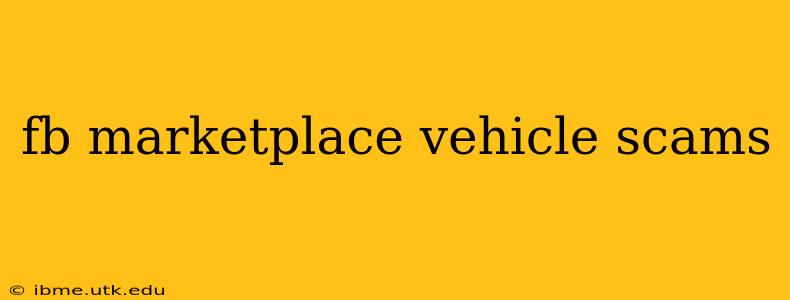Buying a used car can be stressful, but finding a great deal on Facebook Marketplace seems like a dream come true. However, the platform's popularity also makes it a target for scammers. This guide will equip you with the knowledge to navigate Facebook Marketplace safely and avoid becoming a victim of a vehicle scam. We'll explore common tactics, red flags, and protective measures to ensure a smooth and secure car-buying experience.
What are the Common Facebook Marketplace Vehicle Scams?
Several deceptive schemes target unsuspecting buyers on Facebook Marketplace. Understanding these tactics is the first step in protecting yourself. Common scams include:
-
The "Too Good to Be True" Deal: Vehicles listed significantly below market value are often a red flag. Scammers lure buyers with incredibly low prices to pique their interest and lower their guard.
-
Fake Listings and Stolen Photos: Scammers often use stolen images from legitimate listings, making the car appear real. They may even create fake profiles with seemingly credible information.
-
The "Advance Fee" Scam: This involves requesting money upfront for shipping, processing fees, or holding the vehicle. Legitimate sellers will not ask for payment before you've inspected the car.
-
The "Fake Escrow" Scam: Scammers create a false sense of security by proposing to use a fake escrow service. This seems to protect both parties but is ultimately a fraudulent transaction.
-
The "Fake Mechanic" Scam: The scammer may suggest using a specific mechanic who is actually in on the scam. This mechanic will then provide a fake inspection report, confirming the car's legitimacy.
-
The "In-Person Meeting that Never Happens": Scammers might agree to meet for an in-person inspection but continually postpone or cancel at the last minute. This is a tactic to keep you engaged while delaying suspicion.
How Can I Spot a Facebook Marketplace Vehicle Scam?
Being vigilant is key to avoiding scams. Here are some essential red flags to look out for:
- Unrealistic Pricing: If the price is significantly lower than comparable vehicles, be wary.
- Vague or Missing Details: Incomplete vehicle descriptions, blurry images, or lack of contact information should raise suspicion.
- Pressure to Act Quickly: Scammers often create a sense of urgency to prevent you from doing thorough research.
- Unusual Payment Methods: Requests for payments through untraceable methods like wire transfers, gift cards, or cryptocurrency should be avoided. Always use secure payment options like those offered by the marketplace itself or your bank's services.
- Seller Unwilling to Meet in Person: A legitimate seller will usually be happy to meet for an in-person inspection. Be suspicious of anyone who avoids this.
- Poor Communication: Grammatical errors, inconsistent information, or evasive answers can indicate a fake profile.
What Are the Best Practices for Buying a Car on Facebook Marketplace?
- Thoroughly Research the Vehicle: Compare the listed price and features with similar vehicles on other websites.
- Inspect the Vehicle in Person: Always meet the seller in person to inspect the vehicle before making any payment.
- Bring a Mechanic: A trusted mechanic can inspect the car for any hidden problems.
- Use Secure Payment Methods: Utilize secure payment methods offered by the platform or your bank.
- Verify the Seller's Identity: Cross-reference the seller's information with available online resources.
- Report Suspicious Listings: Report any suspicious listings or profiles to Facebook Marketplace.
- Never Send Money Before Inspection: This is paramount; never send any money until you have seen and inspected the vehicle yourself.
- Trust Your Gut: If something feels off, it probably is. Don't hesitate to walk away from a deal that makes you uncomfortable.
How Can I Report a Facebook Marketplace Vehicle Scam?
If you believe you've encountered a scam, report it immediately to Facebook Marketplace and your local authorities. Provide as much information as possible, including screenshots, communication records, and transaction details.
What if I've Already Been Scammed?
If you've already been scammed, contact your bank or credit card company immediately to dispute the charges. Report the scam to the Federal Trade Commission (FTC) and your local law enforcement. Keep detailed records of all communications and transactions. While it’s not a guarantee of recovery, proactive action can improve your chances.
By following these precautions and staying informed, you can significantly reduce your risk of falling victim to a Facebook Marketplace vehicle scam. Remember, a little due diligence can save you a lot of trouble and money.
